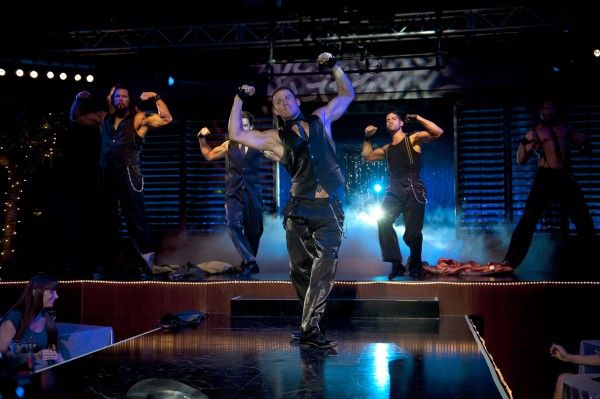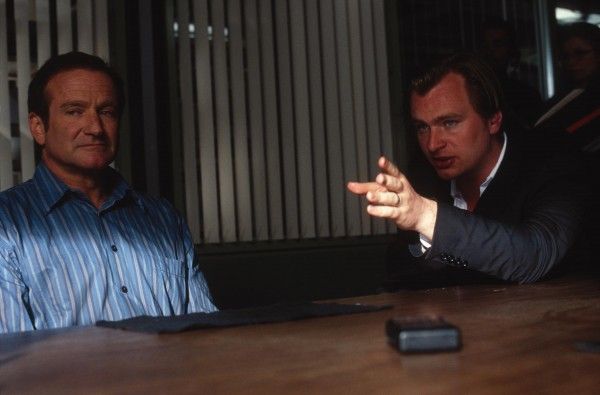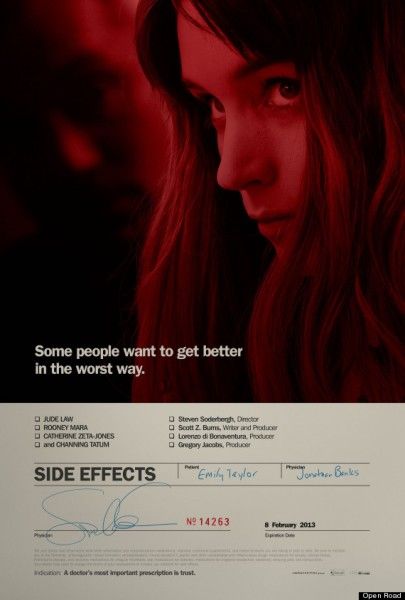With director Steven Soderbergh’s latest film, the psychological thriller Side Effects, hitting theaters this coming Friday, the filmmaker has been sitting down for a few interviews as part of the film’s marketing campaign. This is a curious case, though, because Side Effects also marks Soderbergh’s possibly final theatrically-released film. As such, said interviews have been more varied than usual, with the filmmaker eager to discuss a multitude of subjects.
Steve recently sat down with Soderbergh for a 45-minute interview, and due to the conversation’s length we’re breaking it up into smaller portions before unveiling the whole thing (read Part 1 here). Today, in Part 2, Soderbergh talks about the surprising success of Magic Mike, his involvement in Magic Mike 2, the new box office climate of knowing whether your film has succeeded or failed by Friday afternoon, his second-unit work on The Hunger Games, how he championed Christopher Nolan to direct Insomnia when Warner Bros. wasn’t so sure, and more. Hit the jump to read on.
If you missed Part 1 where Soderbergh talked about his preferred digital cameras, whether digital will match the quality of IMAX, his opinion on 48 frames per second, Kickstarter, and more, click here.
Read Part 2 below, and check back here tomorrow for Part 3.
Steve: Are you a little stunned at the huge success of Magic Mike?
SODERBERGH: Yeah, those numbers were significantly higher than anything we hoped for; they were significantly higher than the numbers that were going to make it work for Warners, for instance. Their buying North America for the amount of money that they paid was predicated on the movie doing like 60, if the movie does 60 we’re gold, so to just fly past that, it was fun because it was so atypical. Even the way it performed was really weird day to day during the week. Danny Fellman, the head of distribution at Warner Bros. would just laugh because, this thing there are just no comps for the way this thing is performing. It’s so weird, just the shifts from day to day during the week. We were trying to figure out is it because women during the week they can babysitters on these days and not those? Certain days would be huge then the next day would be nothing. It was just all over the place. But it’s really fun when the surprise goes in that direction. What was weird was- my experience has been that tracking is very strange; it tends to be very accurate about when things are going to underperform, it tends not to be very accurate and sometimes wildly inaccurate when things over perform, and Magic Mike was the perfect example. According to the tracking we should have opened to 19, and we opened at 38, or whatever. So if I were at Warners and I show up Monday morning I would be talking to those people who do my tracking and saying, “How did we miss by 100%?” If I have a department that’s supposed to be tracking, like, where were those people? Why can’t you find out?
What I’ve been noticing lately, and I’m not the guy for tracking, but I’ve found that on Friday night, the reaction on Facebook and Twitter to your movie is huge, because at 9:00 if everyone getting back form the movie is raving about it, the next two days are going to be huge, and if people are like, “This movie's not good” then all the sudden it goes like this. So maybe that is playing into it.
SODERBERGH: I guess so.
People really liked the movie.
SODERBERGH: What’s interesting to me is so, your methodology for figuring out who wants to see it and who doesn’t has obviously got a gigantic hole in it because you’re not reaching everybody that you have to reach to have relevant data. If you miss by 100%, that’s a lot. But like I said, it tends to be very accurate when shit’s going to not perform. For instance, the flipside of that is Haywire, we knew Tuesday we were going to have a terrible weekend, and we did.
I have to tell you I really dig that movie.
SODERBERGH: I was really happy with it and we felt like it was a fun ride, but couldn’t pay people to go see it.
You did second unit on The Hunger Games, I don’t know if you talked a lot about that, but how did you get involved in that?
SODERBERGH: Well, Gary’s a friend of mine; I’ve known him a long time. At one point, actually, in the mid-90s I was crashing on his couch for three weeks. We just have a history of helping each other out on stuff, I show him everything, I was a producer on Pleasantville. So we just have a long history of kind of doing each other solids when one of us needs help. So he called me in April and said, “I’m looking at the board of Hunger Games and I’ve got these two days of second unit at the end of August, what are you doing? Can you come down? I’ve got to get somebody I trust to do this, would you be interested?” So I said, “Yeah, actually Contagion will be done and we won’t have started Magic Mike, it’s actually perfect. I can literally just fly in and do it.”
What I found really nerve-wracking about it was shooting and really worrying, "Am I getting what he needs? Am I getting what he wants?" When I'm shooting my own stuff I look at it and I go, “OK, I’ve got it, I need this, I got that.” Here he’s off with the first unit, I’m here, I want to deliver for my friend what he needs. I found that aspect of it- I was very anxious that I was getting everything that he needed and wanted. The fun part of it was my job there was to recreate exactly the aesthetic that he and Tom Stern have set up in terms of framing, and lighting, and movement. I’m there to be a chameleon and duplicate that so that it’s seamless. And I love that, I love kind of submitting to that and following their rules. So we went down, we shot a ton of shit, it was really fun and then I didn’t hear from him and I’m like, “Oh, no.” Finally two weeks later he emailed me and he goes, “I just realized I don’t think I ever responded.” He goes, “I’m so happy with the stuff. Thank you.” And I went, “Oh god, dude, you had me completely flipped out, I thought I was going to read that you had to redo it.” He’s like, “No, no, no it all worked out great.” So it was fun, it was a tough show. I was really happy that the movie took off because he worked really hard on it. It was a tough show. I totally understood him feeling like “I don’t want to go back and do that again”, because I would have felt the same.
You’re probably the most qualified second unit director of the last decade.
SODERBERGH: It was fun.
I want to jump back real quick to Magic Mike, Channing has talked about doing a sequel and possibly directing it himself. Obviously you’re going to go and do your own thing but if he were to call you and say, “Hey, I’m doing a sequel” would you produce? Is that something you would be willing to do?
SODERBERGH: Yeah, I’m happy to be conciliary, there’s absolutely another movie to be made out of that. There were a lot of ideas that didn’t make it to the first one that we’ve had discussions about, and here’s an opportunity to do some of these things that we couldn’t get into the first one. Like there’s a lot of stuff still there, stories of shit that happened to him that we just didn’t have time for. So I hope they do it. I’ll help in whatever way I can, I just don’t want to be involved day-to-day. But I’m happy to in a sense be an executive producer and kind of weigh in on stuff. We had a great time making that movie and I don’t have a desire to try and go back and try and recreate it.
You produced Insomnia, you produced Pleasantville, you produced a lot of movies; what is your typical involvement as a producer? Are you very hands on day-to-day? Or are you involved in the pre-production?
SODERBERGH: It depends on the filmmaker, depends on the scale of the movie, I’m sort of keying off what I think people need from me. In the case of Insomnia, he doesn’t need me around, I went to the set one day, literally, just to say hello to everyone and then flew back home. All Chris [Nolan] needed was to get in the fucking door, that was the problem was that the head of the studio at that point didn’t understand why George [Clooney] and I were so lit up about him and I had to go in and go, “You need to give this guy this job. This is good for you.” Once that happened, once he was on, it was literally, “I’ll see you when you’re done.” He doesn’t need help like that. Other people want you to watch everything, it just depends.
Does Chris ever send you a thank you card? [Laughs]
SODERBERGH: No, he and I will try to have lunch like once a year, catch up, you know what I mean? He’s been very vocal about, “I’m so glad I got on that movie because it started the relationship with this studio that turned out to be great for everybody,” and I’m happy because it proved that the sort of mandate that we had at Section 8 of taking interesting, young, independent filmmakers and getting them onto movies that typically would be kind of normal if they weren’t involved, they elevate it, they make it something more distinctive by being involved. That was our whole idea. It’s what I did. I was an independent person and I came in and started working with studios on certain movies. There was this whole wave of people like David O. Russell, that was our whole idea, blend these two things. Why can’t independent filmmakers make shit that opens in 3000 theaters?
So I’m glad that that all played out because Chris is the perfect example of why that can work and also from the studio standpoint my belief is that you should bet on horses not races. You should be developing relationships with talent not based on specific projects but based on the fact that you think they’re talented and that everybody hits and misses but in the long run, it’s like the Clint thing, in the long run you win. If you look at my career, if one person had financed everything I’ve ever made, you’d be up. I’ve had peaks and valleys, but over the long term if you paid for all of them you would have won. That’s why it’s very satisfying to watch his career turn into the career that it’s turned into, because he clearly- it wasn’t a surprise to me, he clearly had that in him. They just, initially, couldn’t see it.
Look for more with Soderbergh tomorrow.





